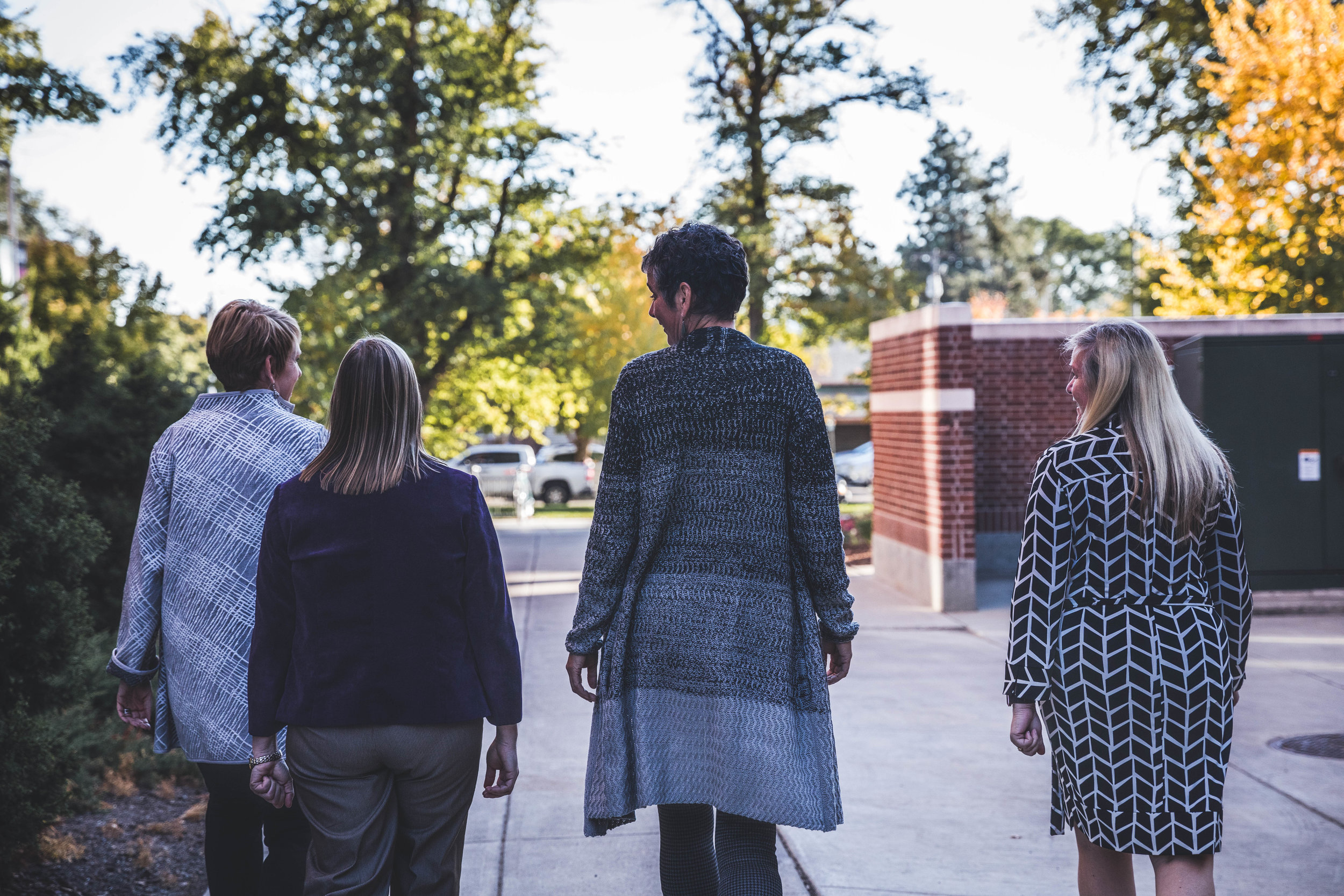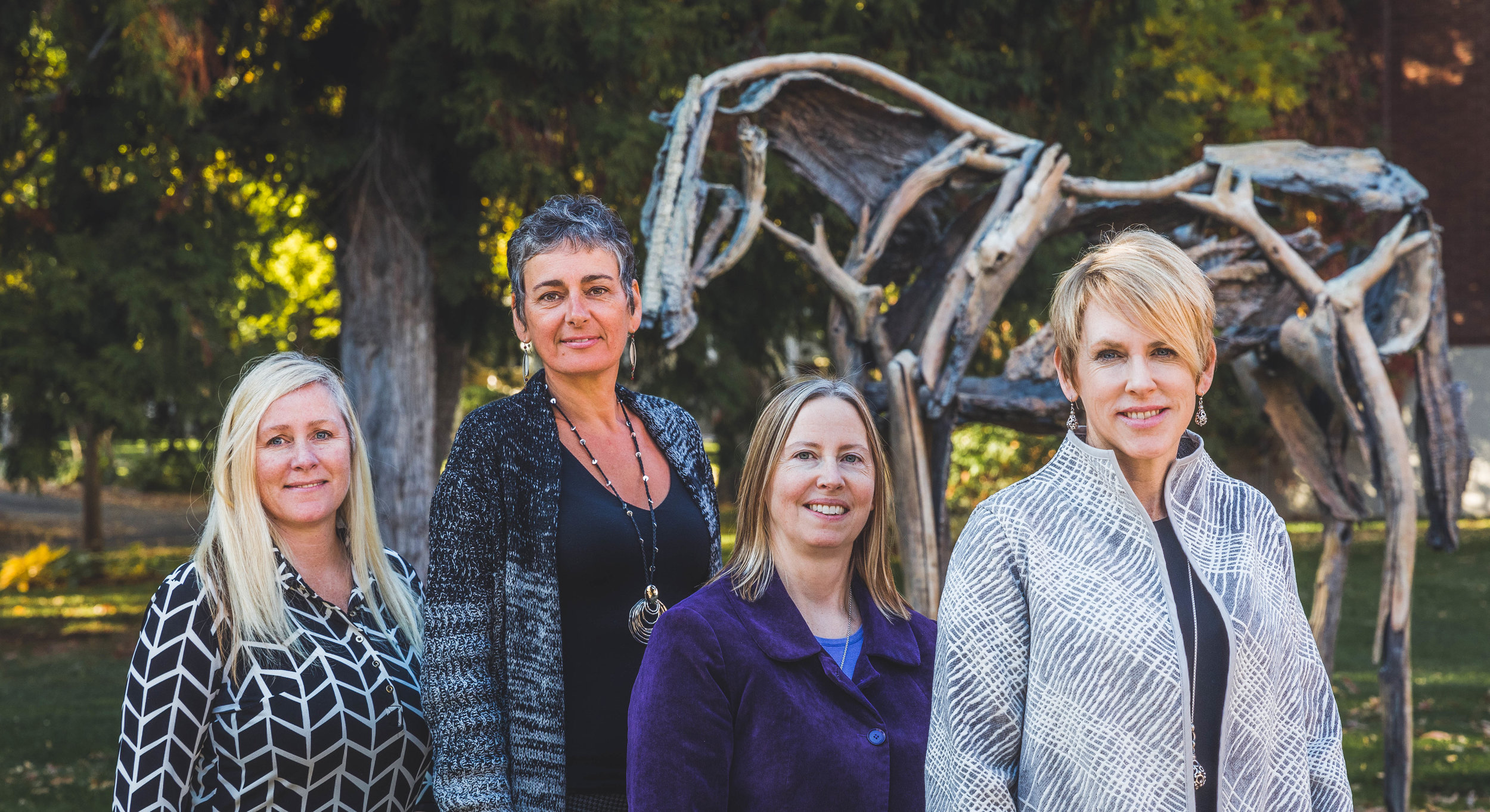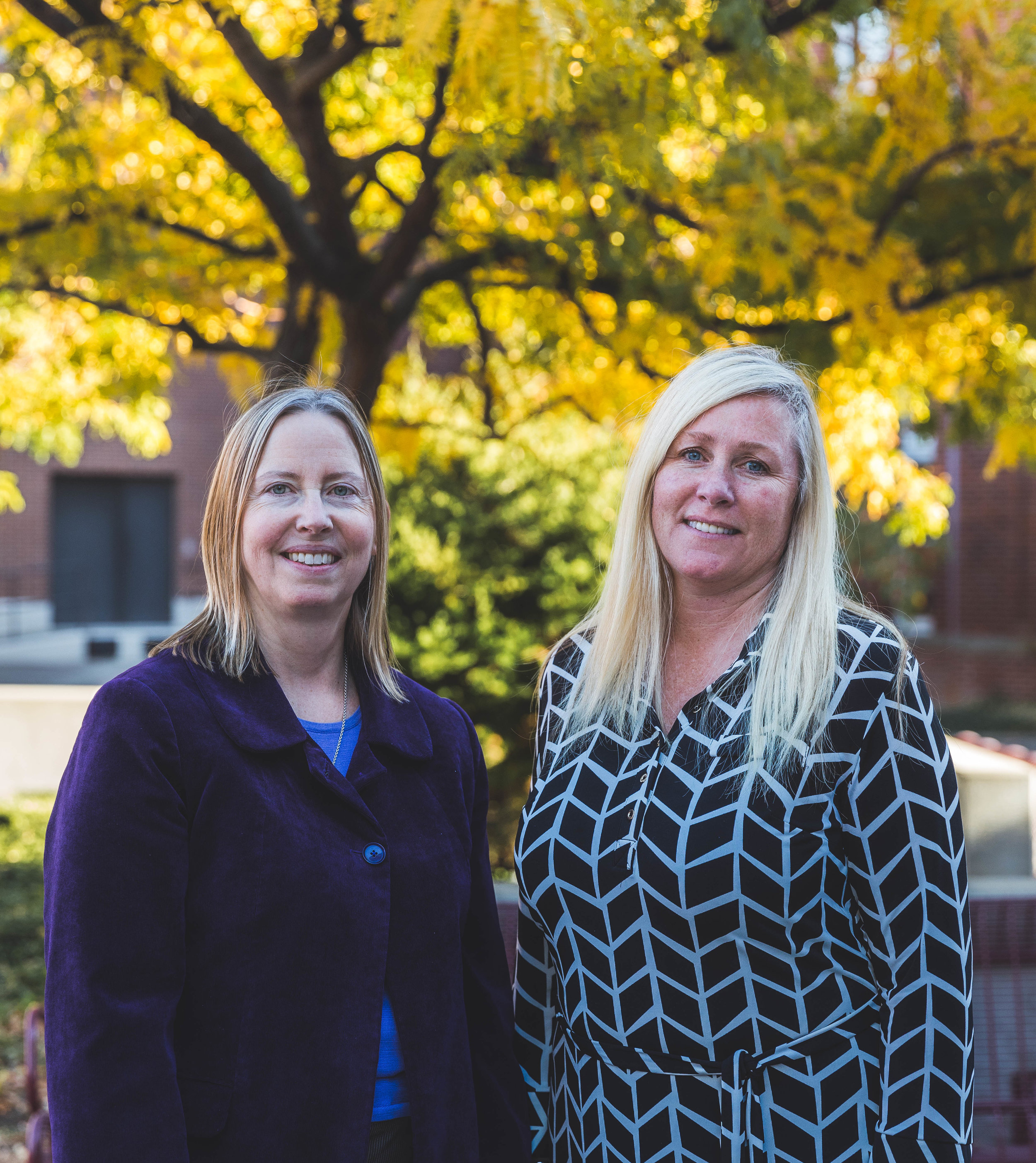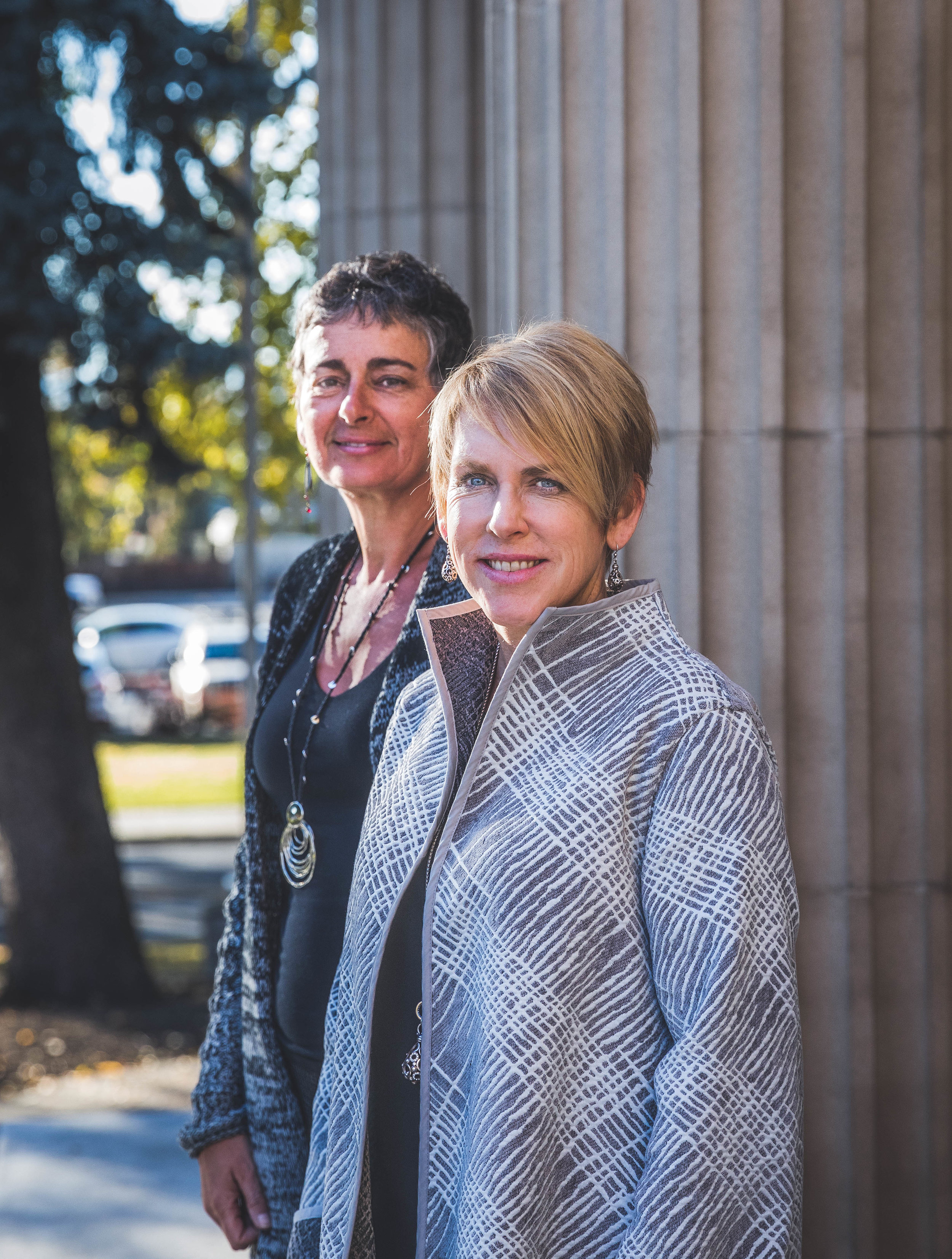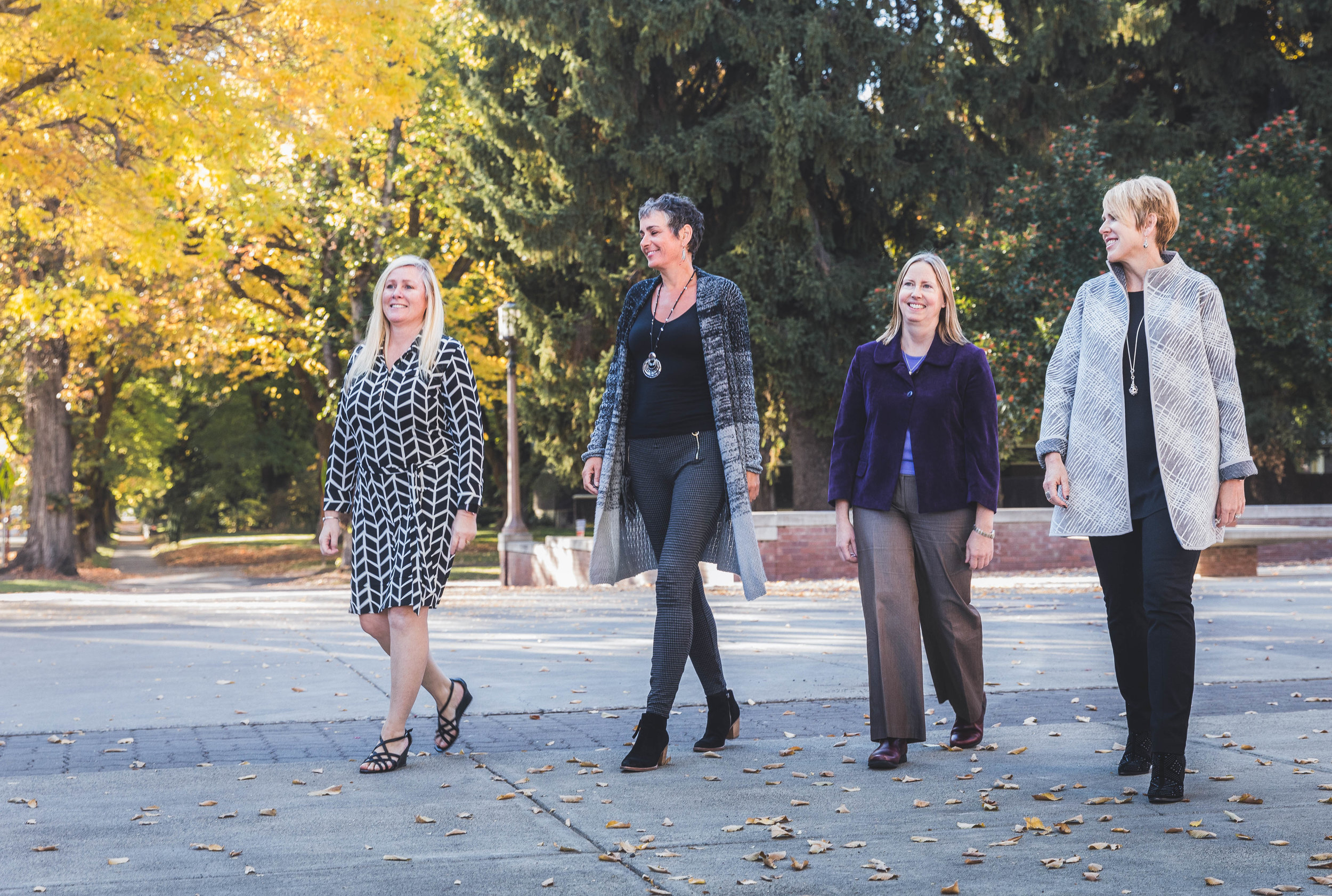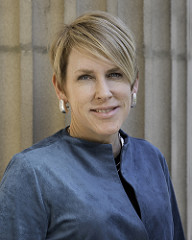She-Leaders
Story By Kateri Moseley
Women of the world: the spotlight’s on you.
This year alone we’ve seen two top-grossing films with female leads, a female presidential candidate come close to the White House (and win the popular vote) and public figures like Malala Yousafzai and Emma Watson championing equal rights for all people.
At Central Washington University, female leadership can be found a lot closer to home.
A handful of CWU administrators offered their perspective—giving voice to their qualifications, struggles and underlying social prejudices they may have faced, as well as their advice and words of inspiration for young women striving to be leaders themselves.
Anne Cubilié, Gail Mackin, Jenna Hyatt, Katherine Frank and Kremiere Jackson let PULSE pull back the curtain and shine a light on the work they do for CWU. Here, the She-Leaders of Central take center stage.
What is it like to be a woman in a leadership position, specifically the problems or challenges you’ve faced?
Mackin – “I worked at Northern Kentucky University for 16 years, and in that time, I was chair of the mathematics and statistics department … I did face situations within the department where I was trying to assert what I believed was the right way to move the department forward, trying to change some of the long historical behaviors that were within the department. … I think there are some situations where I hit prejudices because I was a woman. Fortunately, I just chose to ignore that. I think I have enough faith in myself and enough conviction in my beliefs and I knew my self-worth as a mathematician and as a teacher, so getting promotion...I think I always worried about it, but I wasn’t afraid of it; it didn’t intimidate me.”
Jackson – “Being a woman in a leadership position sometimes means being discounted, overlooked, dismissed, disrespected, overshadowed and judged. Being told you’re not good enough—because you are a woman.”
Frank – “I think you feel that you often have to work harder and do a more direct job of convincing people that you're ready for the positions that you're in. I think as a woman I've had to continue to work on developing my leadership style and adjust based on how an audience perceives you or might perceive you. I think women in leadership roles will tell you that they've struggled with different things depending on who they are and sort of what their pathway has been. And how then they make adjustments in their personal life. I’m married but I don't have children and I would say for me this had made me immerse myself in the workplace and that it is difficult to let go. I take my work home with me, and it remains my main focus.”
Hyatt – “Interestingly enough, I’ve never been supervised by a woman. … My dissertation actually explored just this issue. I focused on women senior housing officers in the northwest region of the United States. I needed to understand why was it that there were so few women working in housing. My study basically illuminated five core constraints that women face, and I would have to echo the findings of my research with my own experience. … There are certain skills that we get at certain levels of our profession, and what was happening for these women—and ... what happened with me too—is certain roles or responsibilities were more accessible [to] men than women.”
Cubilié – “I’m a very single-minded individual, I guess. … The U.N. is really in many ways a boys’ club, you know. It is still run by a bunch of older men from all over the world in suits, and it’s wonderful because you work with people from all over the world which is an incredible privilege, but ... it is very hard. It’s the same struggles in the United Nations [both] in America or many other countries, which is women’s representation. So, there have been many, many times when I was one of the only women sitting around a table. … I think it’s incredibly important for people to realize that women’s enfranchisement and representation at all levels is [an important issue] for everybody. It’s as important for men and boys as it is for women and girls.”
What do you think a leader is?
Cubilié – “I think a leader is somebody who … thinks about how their own personal values and sets of beliefs interact with the cultures around them, and thinks about it in positive ways. Someone who recognizes that they have things they can bring to the table that can be helpful, and also things that probably aren’t so helpful. A leader has to be someone who listens and who makes space for others and who in my mind empowers other people to lead and to move forward. … I think what we really need is diversity at all tables. Diversity in background and thought and experience, as well as things like gender and ethnicity.”
Hyatt – “Leadership is an opportunity to really create capacity for moving a body of folks towards a common goal. To have the ability to inspire and empower folks toward something bigger than themselves but binds them together. … Every day is owning what you say, you promise to do or you strive to do.”
Frank – “A leader sets a good example. I think a leader tries to create the space and time for other people to do good work. ... I think it’s a leader’s responsibility to mentor, [and] to create opportunities for other people to learn how to lead. I think a leader is a professional. I think integrity is of the utmost importance. But, a leader is a learner. So, you should always be thinking about ways that you can adjust and improve.”
Jackson – “[A leader is] a person who cares about the well-being of those that you lead. A person who helps others find their individual direction and sets big goals for a team to aspire to reach. Someone who is not judging themselves or others by their failures, but is learning from their own setbacks and encouraging others to do the same.”
Mackin – “A leader is someone who … has a vision and has passion about who and what they’re leading. And then has the capacity to engage with the folks that they work with in such a way that they can excite and convey the need or the reason for making changes, because leadership is about change in some respects. … A leader should always be striving to improve and encourage the folks that they work with to be excited about those improvements and actually tap into the skill set and the intelligence of the people that they’re working with to optimize their efficiency.”
Do you consider yourself a leader?
Hyatt – “I certainly strive to be. Every day I ask myself, ‘Would I hire myself today?’ ‘Did I make things better?’ ‘Did I help create a healthy environment?’ ‘Did I help keep my eye on what the goal is?’ and ‘Did I inspire my team to remember what our goal is and not get caught in the minutia of any hard problems in front of us, but really what’s on the way for what we’re really striving for?’ So, I would say I hope [I] am. I intend to strive for that.”
Mackin – “Well, yes. Yes, I do. I like people, I like to get people together. One of the things that I’m very good at is ... identifying issues, problems, parameters, and then finding the people who can help me fix them.”
Cubilié – “Yes. I hope I try to empower others, I try to be open with my views, I try not to be disingenuous, I try to create safe or at least secure spaces for people to debate and disagree and have diverse opinions. And I really believe in systems and stability, so I really hope that I can help build foundations that are sustainable.”
Jackson – “Yes, I am a leader. I set direction and focus for my team. I talk and discuss our key issues and our way forward as individuals and a team together. As a leader, I always encourage the growth of others, both peers and those on my team.”
Any advice or resources for aspiring
She-Leaders?
Jackson – “Never, ever limit yourself. Try new things. Don’t let others or a failure define who you are. Challenge yourself every day. Be the leader you want to follow and dream big—really big!”
Mackin – “Do it. Just do it. Find something that you’re passionate about and follow that. Take on the opportunities that might at first glance not seem to be that exciting or you’re a little unsure that you can actually fit into, or that might be a bit too much to bite off and do. … You work hard, you talk to people, you follow through, and you build a reputation of being reliable, of being insightful, and doing an exemplary job. The second part is to be resilient, and recognize that you’re not always going to be tapped for this position or that position. And that’s fine. … Other opportunities will avail themselves to you as long as you’re open to them.”
Hyatt – “I guess just to reach out and gather this incredible network and meet each other and just have some solidarity of support outside of their bubble, just to get them past their day-to-day. To see something bigger and strive to understand and support each other in a confident, competent environment. … I would say that mentors come from anywhere, sometimes those that are even least expected.”
Frank – “Believe in yourself. Never let anybody tell you you can’t do it. Apologize when you have a reason to apologize, but don’t apologize just to apologize. Find a mentor. Find lots of mentors actually. And think about what it is about these individuals that inspire you, what questions you have for these people and don’t be afraid to use them … and thank them. Thank them for their support. ... These are people that know a lot and will help you to continue to learn. Be brave.”
Cubilié – “I think any young woman on campus or anywhere should look for mentors. They can be men or women, but they need to be people that you’re comfortable with, that will support you in what you want to do, to realize your own goals and your own dreams, to help you figure out how to get there and how to take the steps to get there. … It’s good to think ahead. ... You have to figure out where you need to be in five years that will have put you on the road toward getting to where you think you want to be in 10 or 15 years. ... I also think especially if you feel you come from a kind of fragile background that you don’t have a lot of foundation and support from your family or from your community, then it’s even more important to try to build the friendship networks and professional networks that you may need because all of us have to have a strong foundation. It’s so much easier to take risks when you feel that you have a solid foundation to take them from.”

